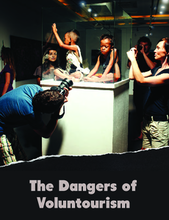In this article for Prism Magazine, a publication of Evangelicals for Social Action, the authors ask challenging questions about the active role played by the Western Church "not only in funding orphanages where they may not be needed but also encouraging "orphanage tourism" disguised in the form of short-term mission trips." They review the evidence from global research that has demonstrated the adverse impacts of residential care on the development of children and their protection rights, and ask some challenging questions: "Why are orphanages unacceptable for children in my country, but acceptable for children in the developing world?" "Would I ever want my child to end up in an orphanage?" The article highlight findings from global research that most children in 'orphanages' in fact have parents and that many of the children are in these institutions for other reasons, in particular extreme poverty, illness, or lack of access to social services, in particular education. They give the example of Cambodia where contrary to the Government's recent policies stating that family and community-based care are the best option for children and that new residential programs should not be encouraged or pursued, the number of children in orphanages has increased by 75 percent since 2005, and the majority of these children were accepted by nonprofit international organizations.
The authors also explore the role of 'orphanage tourism' in this context, where Westerners visit or volunteer to work at a residential care center (orphanage) in the developing world, whether the trip is arranged by a tour or travel company, a nonprofit, or by a church, and whether it entails one person dropping in to visit children at an orphanage for a few hours or a group of a dozen people coming to work at the orphanage for several weeks or months. They point out that, although orphanage tourism generally occurs out of good intentions, it is rarely in children's best interest and it can also be extremely harmful, leading in worst case scenarios to child protection concerns as well as significant misappropriation of funds. The authors also highlight that orphanage tourism leads to increasing demand for these types of opportunities in other orphanages or even to the opening of new orphanages to attract funding from donors. They point to a growing realization among ministries and organizations globally that new innovative solutions are needed to ensure orphans are cared in safe and loving families. Perhaps most powerfully, the authors call on the readers to explore their own motivations by confronting the reality of global inequalities: "Unfortunately, however, the reality is that orphanage tourism -regardless of how happy the child seems or how big a donation you give to the organization- is not a true connection between peers. The children you visit will likely never have the opportunity to reciprocate a visit, nor do they really have a choice about meeting and spending time with visitors. Your visit is much more about your emotional desire than it is about what the children need to be healthy and/or happy."

